 Abraham Lincoln
If given the truth, the people can be depended upon to meet any national crisis...
Abraham Lincoln
If given the truth, the people can be depended upon to meet any national crisis...
 Guildford news...
for Guildford people, brought to you by Guildford reporters - Guildford's own news service
Guildford news...
for Guildford people, brought to you by Guildford reporters - Guildford's own news service
Insight: Running an Election – Part One The Vote
Published on: 28 Apr, 2024
Updated on: 9 May, 2024
With more elections looming across the county, including one for the Police & Crime Commissioner role, Bernard Quoroll recounts his experiences as a local government officer and as a returning officer.
Part 1 – The Vote
former local authority CEO and returning officer
I have been involved in elections since 1971 when I first acted as a very junior poll clerk in Margaret Thatcher’s constituency in Barnet.
Since then I have undertaken or supervised every election role in the UK from Presiding Officer to returning officer and in every kind of election from municipalities, through Parliamentary constituencies and even a European MEP count centre, tallying half a million votes.
I was a returning officer for about 17 years, responsible for every aspect of running elections in my local authority areas of responsibility. During that time I “returned’” some notable Members of Parliament including Joan Lestor, Sir David Lidington and Sir Richard Needham together with literally hundreds of local authority councillors.
From 2003 I have acted as an international election observer, undertaking some 30 observation ‘missions’ as they are called, for the Organisation for Security and Cooperation in Europe and most often in post-Soviet Union or post-conflict countries.
In the UK, getting an election wrong is a career-threatening event, so you need to take it very seriously. And, it is also a personal responsibility which can lead to legal liability for the costs of rerunning an election, so insurance is essential.
My generation of local authority chief executives were mostly lawyers which was probably the best qualification. (Legally trained UK-based election observers were also much sought after by the OSCE because we represented a gold standard for election observers, many of whom had less knowledge of election law and practice).
A key difference between elections here and most other countries is that no politicians are involved in our elections, other than as candidates.
The returning officer appoints all the polling staff and ensures they are not active in local politics. In that way it is possible to run a polling station with only three or four people. In other countries, the political parties often so distrust officials and each other that all have to be represented in the polling stations.
It is not unusual to see 10-13 people from different parties sitting behind the tables in a polling station, all watching each other and in the most contentious countries, ready to guard the ballot boxes if the lights go out!
Another difference between elections here and abroad is that in the UK the count is usually conducted in one central location, while in other countries it is done in hundreds of individual polling stations, then aggregated regionally before onward transmission to the election headquarters.
In UK elections, no individual element is complicated but added together, all the tasks which have to be undertaken within an unforgiving timetable represent something of a logistical nightmare. Checking the availability of perhaps hundreds of polling stations, finding conscientious people with the necessary form-filling skills who are reliable and willing to work the long hours for a modest reward gets harder with every passing year.
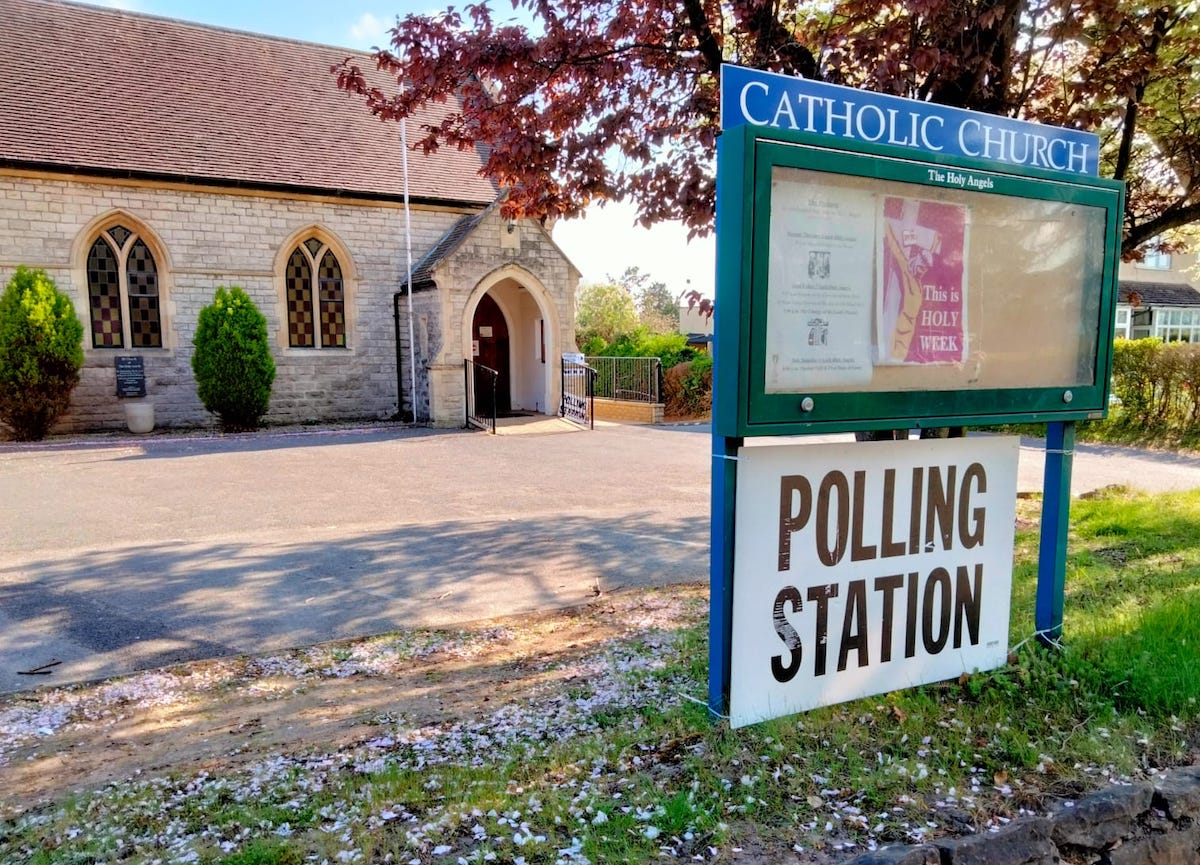
The availability of all polling stations, such as this one in the Roman Catholic church in Ash, have to be checked.
Ideally, I would want to employ individuals who already worked in my office and who would have to come into work the next day and explain to me why they had made a mistake, if they did not complete their ballot returns properly.
During the year, typically only two or three people are responsible for election matters, primarily engaged in maintaining the register of electors. Once an election is called, the team is enlarged by seconding in other administrators, perhaps a dozen staff in total, each of whom develops a specialty, like issuing and opening postal votes or checking the availability and accessibility of polling venues and understudying other roles.
The returning officer is paid a taxable lump sum. If he or she is wise, it will be shared equitably with the election team who have to put in long hours unpaid and whose goodwill is essential.
All the candidates in a national election would typically want a photo opportunity with the returning officer. My practice was to offer a round table with the media present, but only if all the candidates or their election agents would agree to turn up. The canny ones would want to shake your hand when there was a photographer in range, which meant you needed to keep your hands in your pockets!
It also gave me an opportunity to remind them all together of the rules, a bit like the referee before a boxing match. The period in the run-up to election day is one of enforced purdah, avoiding all controversy in decision-making in case it might affect the vote.
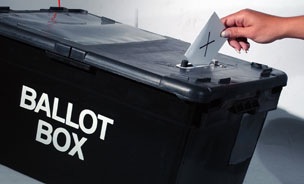 On the evening before the day of the election, all presiding officers who run polling stations come to the civic offices to collect their ballot boxes, ballots and all the necessary forms for polling stations.
On the evening before the day of the election, all presiding officers who run polling stations come to the civic offices to collect their ballot boxes, ballots and all the necessary forms for polling stations.
For returning officers with responsibility for two constituencies as I was, this could amount to perhaps 300 people, keen to get home and check their materials. But first, they had to listen to a pep talk from me about impartiality, treating people with respect and not cutting corners.
The newbies listened attentively. The old hands thought they knew it all but were often the ones who made mistakes. On their way out, they all had to pass through a mock polling station laid out to demonstrate best practice.
Some went home and sat until quite late at night, reminding themselves of the rules, checking that the serial numbers on their allotted ballots had been printed sequentially and making sure that all their materials were present for the following day.
Most will have to get up at soon after 5 am. There may be the odd problem during the night, illness or the car breaking down, necessitating a standby team to be on call in case of need.
Morning arrives and often in the dark they set out early to set up their stations. Occasionally someone sleeps in, or cannot start the car, so it is an anxious time for returning officers.
On my first time out as a presiding officer in a polling station, I found that the headmaster in the super-school where I was working, had moved the polling station from one side of the school to another, with a different postal address and about a quarter of a mile away from the advertised location. (Heads were not always cooperative in those days and sometimes wanted to make a point about disruption of the school curriculum).
Confronted by a notice on the locked classroom door that I was expected to move to another less accessible place, which would confuse voters, I had to kick the door in and report what had happened. When the head arrived later in the day, incandescent that he had been disobeyed, he was presented with a bill for the damage.
If mistakes are going to be made, they will generally happen early on, before people have fallen into the rhythm of things. So the returning officer and senior team will tour their patch first thing, checking that polling stations are properly laid out and that the rules are being followed. It is a very long and often cold day.
Staying bright and welcoming can be a challenge, especially when confronted by the occasional drunk or the inevitable pocket lawyer, wanting to explain why the poll is not secret but voting anyway. I always found it amusing when famous people turned up, expecting to be recognised and fumed when they were politely asked for a name and address, just like everybody else.
It was also fun to watch parents showing their children how to vote and to see couples whispering loudly to each other across the room about who to vote for, although that was illegal and usually triggered intervention. Special arrangements are supposed to be made for disabled and unsighted people but they do not always work very well in old buildings not designed for the purpose.
In rural areas, finding an appropriate venue can be very problematic. For example, the use of Masonic Lodges can trigger complaints and static caravans are generally used only as a last resort. The most popular venue to my recollection was the bar of a village pub – warm and welcoming with a blazing fire in winter but sadly with the beer switched off for the day.
At a few minutes before the close of the poll, it would be common for the pubs to empty and a queue to form just before the doors of the polling station were due to be locked.
Outside the polling stations, there are also things to do. One candidate decided to try to spend the day at the entrance to a polling station, meeting and greeting voters and surrounded by a ring of small ‘vote for me’ placards. He was only persuaded to leave when I pointed out that his actions might cause a petition and rerun, which he would have to pay for personally.
Some candidates liked to hover inside polling stations after themselves voting and until ushered away. Election posters would sometimes appear mysteriously and illegally in public places and have to be removed. Tellers who are not part of the election process but represent political parties, can be problematic.
Sitting near the entrance to a polling station they can be heard asking people to tell them their voting intentions which can feel very intrusive. My practice was to insist that they only talk to people when leaving but this is hard to enforce. They often know the voters personally and can take the opportunity to have a long gossip.
I received a complaint from one voter that after a lengthy chat outside, she had gone home forgetting entirely to vote! Very occasionally the media would get a story that voters in a new block of flats had not been included on the register – every returning officer’s nightmare.
The poll closes and the focus moves to the count centre.
In the next Insights article Bernard Quoroll recounts his experiences overseeing The Count
Responses to Insight: Running an Election – Part One The Vote
Leave a Comment Cancel replyPlease see our comments policy. All comments are moderated and may take time to appear.
Recent Articles
- Guildford Institute’s Crowdfunding Project for Accessible Toilet in its New Community and Wellbeing Centre
- Letter: Guildford – Another Opportunity Missed?
- Letter: GBC’s Corporate Strategy – Where Is the Ambition?
- My Memories of John Mayall at a Ground-breaking Gig in Guildford Nearly Six Decades Ago
- Westborough HMO Plans ‘Losing the Heart of the Street’ Says Resident
- College Invests to Boost Surrey’s Economy and Close Digital Skills Gap
- Community Lottery Brings Big Wins for Local Charities
- GBC Housing Plan Promises ‘A Vibrant Urban Neighbourhood’ Near Town Centre
- Hospital Pillows ‘Shortage’ at the Royal Surrey
- Updated: Caravans Set Up Camp at Ash Manor School


Recent Comments
- Ian Macpherson on Updated: Main Guildford to Godalming Road Closed Until August 1
- Sara Tokunaga on GBC Housing Plan Promises ‘A Vibrant Urban Neighbourhood’ Near Town Centre
- Michael Courtnage on Daily Mail Online Reports Guildford Has Highest-paid Council Officer
- Alan Judge on GBC Housing Plan Promises ‘A Vibrant Urban Neighbourhood’ Near Town Centre
- John Perkins on GBC Housing Plan Promises ‘A Vibrant Urban Neighbourhood’ Near Town Centre
- S Collins on GBC Housing Plan Promises ‘A Vibrant Urban Neighbourhood’ Near Town Centre
Search in Site
Media Gallery
Dragon Interview: Local Artist Leaves Her Mark At One of England’s Most Historic Buildings
January 21, 2023 / No Comment / Read MoreDragon Interview: Lib Dem Planning Chair: ‘Current Policy Doesn’t Work for Local People’
January 19, 2023 / No Comment / Read MoreA3 Tunnel in Guildford ‘Necessary’ for New Homes, Says Guildford’s MP
January 10, 2023 / No Comment / Read More‘Madness’ for London Road Scheme to Go Ahead Against ‘Huge Opposition’, Says SCC Leader
January 6, 2023 / No Comment / Read MoreCouncillor’s Son Starts Campaign for More Consultation on North Street Plan
December 30, 2022 / No Comment / Read MoreCounty Council Climbs Down Over London Road Works – Further ‘Engagement’ Period Announced
December 14, 2022 / No Comment / Read MoreDragon Interview: GBC Reaction to the Government’s Expected Decision to Relax Housing Targets
December 7, 2022 / No Comment / Read MoreHow Can Our Town Centre Businesses Recover? Watch the Shop Front Debate
May 18, 2020 / No Comment / Read More



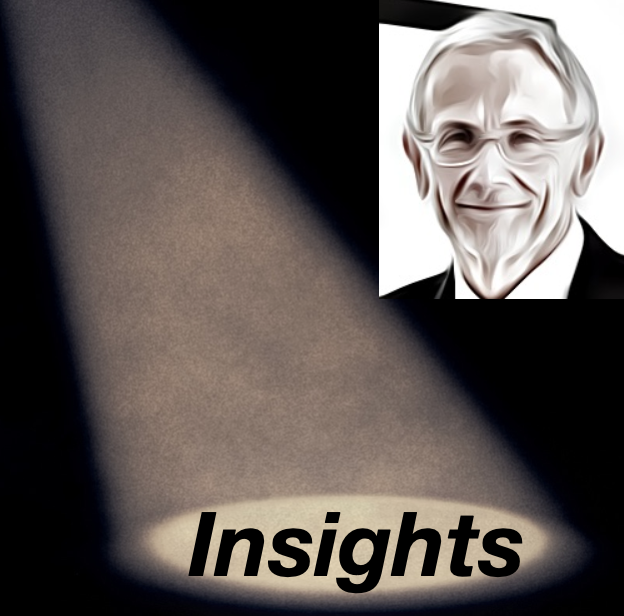
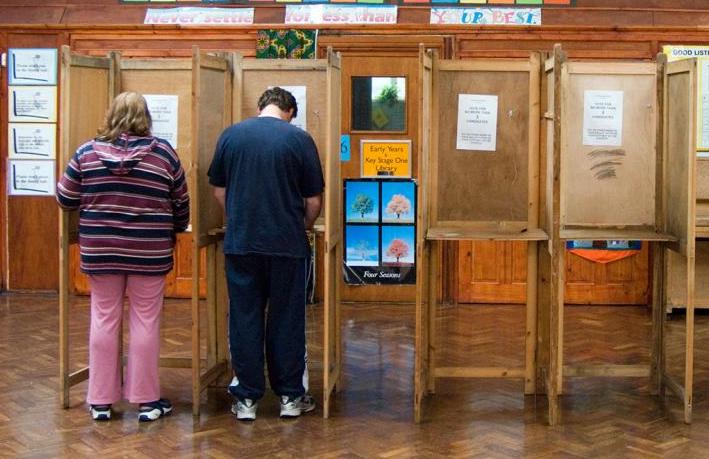
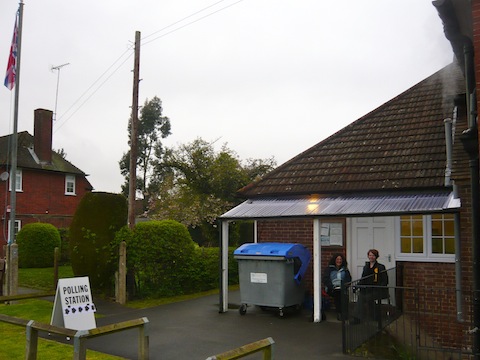






Claire Morris
April 28, 2024 at 10:21 pm
I love working the election but it can be very long hours particularly if the general and local elections are combined. I remember once working the election day which started by needing to be at Polling Station at 6am then when the polls closed at 10pm we went over to the count, and counted the general election through the night till about 6am.
Went home to try to sleep for a few hours but had to be back at the count by 12pm to do the locals which then again went on till the early hours of the morning. Went home again to sleep but had to be back again on the Sunday to count the parishes which also went late.
You loose count of the hours passed and cans of cola drunk but there is a real “buzz” about an election which keeps you going, its great to be part of.